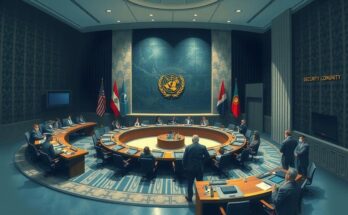The UN High Commissioner for Human Rights, Volker Türk, described Myanmar’s worsening human rights crisis, noting significant civilian casualties and a vast humanitarian catastrophe. He condemned the military’s brutal tactics and called for international intervention. Concurrently, a report on South Sudan revealed ongoing violations and corruption, indicating that leaders continue to fail their people despite promises of improvement. Both situations demand immediate action from the global community.
The United Nations High Commissioner for Human Rights, Volker Türk, expressed grave concern over the deteriorating human rights situation in Myanmar, characterizing it as a profound epidemic of human suffering. In his address to the Human Rights Council, he highlighted the devastating consequences of ongoing conflict and economic distress, which have displaced numerous civilians, forcing them to endure incredible hardships.
Mr. Türk reported that violence in Myanmar resulted in over 1,800 civilian deaths in 2024 alone, marking the highest casualty rate since the military coup in 2021. Indiscriminate airstrikes and artillery bombardments have become commonplace, and significant attacks against critical civilian infrastructures such as schools and hospitals have escalated. The UN chief condemned the military’s horrific tactics, including torture and summary executions, which have led to the deaths of nearly 2,000 individuals in custody since the coup.
The ongoing strife has led to a humanitarian disaster in Myanmar, with approximately 3.5 million people displaced and 15 million facing severe hunger, two million of whom are on the brink of starvation. Violent encounters between military forces and opposition groups have wreaked havoc, particularly in Rakhine state, where clashes have claimed countless lives and intensified the suffering of the besieged Rohingya community. In 2024, tens of thousands of Rohingya fled to Bangladesh, with grisly statistics revealing that around 650 people perished during their perilous maritime journey.
Moreover, Myanmar is grappling with a severe economic downturn that has exacerbated crime and corruption. Reports indicate it remains the world’s premier opium producer and has become a significant hub for synthetic drugs. Furthermore, rampant human trafficking is prevalent, notably with victims being coerced into cybercrime and subjected to various forms of violence and forced labor.
The UN rights chief also condemned the military’s enforcement of conscription, which has led to arbitrary arrests and forced recruitment aimed largely at the youth, subsequently driving many to flee the nation and exposing them to further exploitation. Mr. Türk emphasized that the international community must be more proactive in addressing Myanmar’s myriad crises, reiterating calls for an arms embargo and targeted sanctions intending to safeguard the civilian population.
In a separate discussion, the UN Commission on Human Rights presented a report on South Sudan’s dire situation, highlighting ongoing human rights violations including extrajudicial killings and the forced recruitment of children amidst rampant ethnic violence. Yasmin Sooka, the Chair of the Commission, deplored the political leaders’ failure to protect their citizens, emphasizing, “It is unconscionable that so many years after its independence, political leaders continue their violent contestations across the country and are abjectly failing the people of South Sudan.” The report called attention to systemic issues that hinder vital services and an end to corruption.
In summary, both Myanmar and South Sudan are grappling with critical human rights crises, as highlighted by the UN Human Rights Council. Mr. Türk’s address detailed the horrendous human suffering experienced by civilians in Myanmar, exacerbated by violence, economic collapse, and human trafficking. In South Sudan, despite the country’s independence, political leaders continue to neglect their citizens, reinforcing instability and systemic corruption. The international community’s intervention is urgently required to alleviate these humanitarian disasters and hold accountable those responsible for egregious violations.
Original Source: news.un.org




